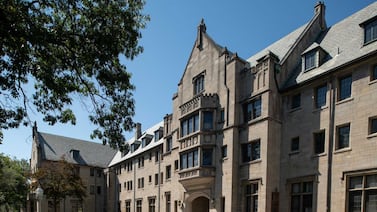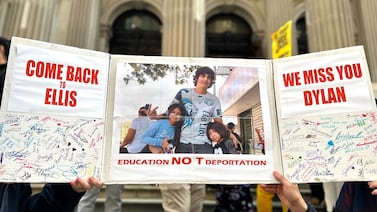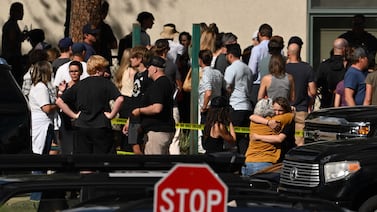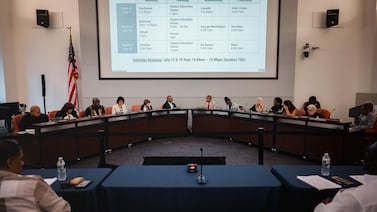Sign up for Chalkbeat Colorado’s free daily newsletter to get the latest reporting from us, plus curated news from other Colorado outlets, delivered to your inbox.
In third grade, Janet Damon had a classroom teacher who made her feel unwanted. She said she doesn’t remember the teacher’s name, probably because she was afraid of her and rarely spoke it.
But what’s always stayed with Damon about that difficult year is how important it is to make students feel valued. It’s something she prioritizes in her work as a social studies teacher at Denver’s DELTA High School, a small alternative high school for students who’ve struggled elsewhere.
It’s also a quality that helped Damon become Colorado’s 2025 Teacher of the Year — an award announced during a surprise ceremony at DELTA in early October. She was among seven state finalists for the award and will now be a contender for the National Teacher of the Year title.
Damon talked to Chalkbeat about how she helps students understand their place in the sweep of Colorado history, why she started a lunchtime yoga class, and what a grandmother caring for nine grandchildren taught her.
This interview has been edited for length and clarity.
Was there a moment when you decided to become a teacher?
My father was in the military so we’ve moved every three years. I was born in Germany, then we moved to Korea, then to South Carolina, then to New Orleans. While we were there, I had one of my favorite teachers, Miss Walsh, in second grade. She just adored me and I enjoyed her.
Then for third grade, we came to Fountain, outside of Colorado Springs, and I had a teacher — my first teacher ever who did not feel that way about me. I even remember when they walked me to her classroom and she saw me. It was like her face fell. I remember not getting taken to specials. She would keep me in the room to do coloring sheets. I just remember I would sit there and just kind of cry. That’s when I started running little classrooms in my room. I wanted to be a teacher that made people feel loved, like Miss Walsh made me feel loved.
Tell us about a favorite lesson to teach.
The history of Colorado because our state is so multifaceted and multiracial, and has these moments where Coloradoans stood up on issues they really cared about — Barney Ford, Clara Brown, Justina Ford. We talk about how there were immigrants from all different groups. They were Irish, German, people who were of Jewish ancestry. We also learn how Colorado’s indigenous community had a lasting legacy — when you think about the mountain highways, a lot of those are over indigenous trails that the Utes created.
The kids then begin to understand that their journey in Colorado is also going to be very special. We do this cartography of the challenges and the successes of different Colorado folks. They make a podcast about a critical issue impacting Colorado and make a life map of what Colorado’s challenges will mean for them and how they are going to overcome them.
I think our students sometimes think, “I’m the only one having to face this challenge ever.” No. Generations and generations faced so many challenges, and every time they moved the dial forward on justice, equality, liberation, it helped you. You will also have to do something that’s going to make Colorado even better for the next generation.
You recently started lunchtime yoga classes. How have you seen this impact students?
It’s really beautiful to see students engaging with their bodies in this way. When we started doing yoga, some students were really surprised when I said, “OK, let’s do a forward fold, and you’re going to reach your hands for your feet.” A lot of students said, “Miss, I can’t touch my toes.” We talked about how our bodies are usually held in different positions at work, at our desks, and those positions can cause some of our ligaments and tendons to constrict.
Some of our students here at DELTA work jobs where they’re using machines and doing labor that involves repetitive motion. Even to raise their hands over their heads is difficult. Now, after two weeks, one of the young men can lift his hands above his head, and that’s an epiphany for him.
Tell us about a memorable time — good or bad — when contact with a student’s family changed your perspective or approach.
When I worked at a previous school, a grandmother was taking care of nine grandchildren. All three of her daughters had become incarcerated at a similar time. I saw every day the challenges that grandmother had to go through, both physically and because of the trauma that the whole family had experienced. In that, I saw love.
What it taught me is that our students are here because of love. I have an obligation to treat them as if they are the most important person in someone’s world, because they are.
What is something going on in the community that affects the students you teach? How do you address it?
A lot of my students work because their parents need them to work. When I see a student who is tired and nodding off. I’m not thinking, ‘Oh, you were just playing video games.” I will ask, “When did you get off last night? When did your shift end?” They might say, “Yeah, it was 11:30 p.m., and then I had to get home and catch up with my homework.”
We have some students who don’t get a lot of support, and that’s why I think schools like DELTA are so important. It’s not easy, because students have a lot of needs. However, we are this promise that if you get your education, you’ll have more opportunities in the future.
What are you reading for enjoyment?
As part of a book club for mothers and women within the “Afros and Books” book club I co-founded, we are reading “Set Boundaries, Find Peace: A Guide to Reclaiming Yourself,” by Nedra Glover Tawwab.
Ann Schimke is a senior reporter at Chalkbeat, covering early childhood issues and early literacy. Contact Ann at aschimke@chalkbeat.org.





